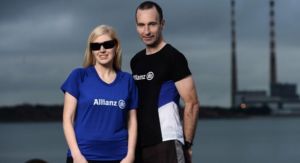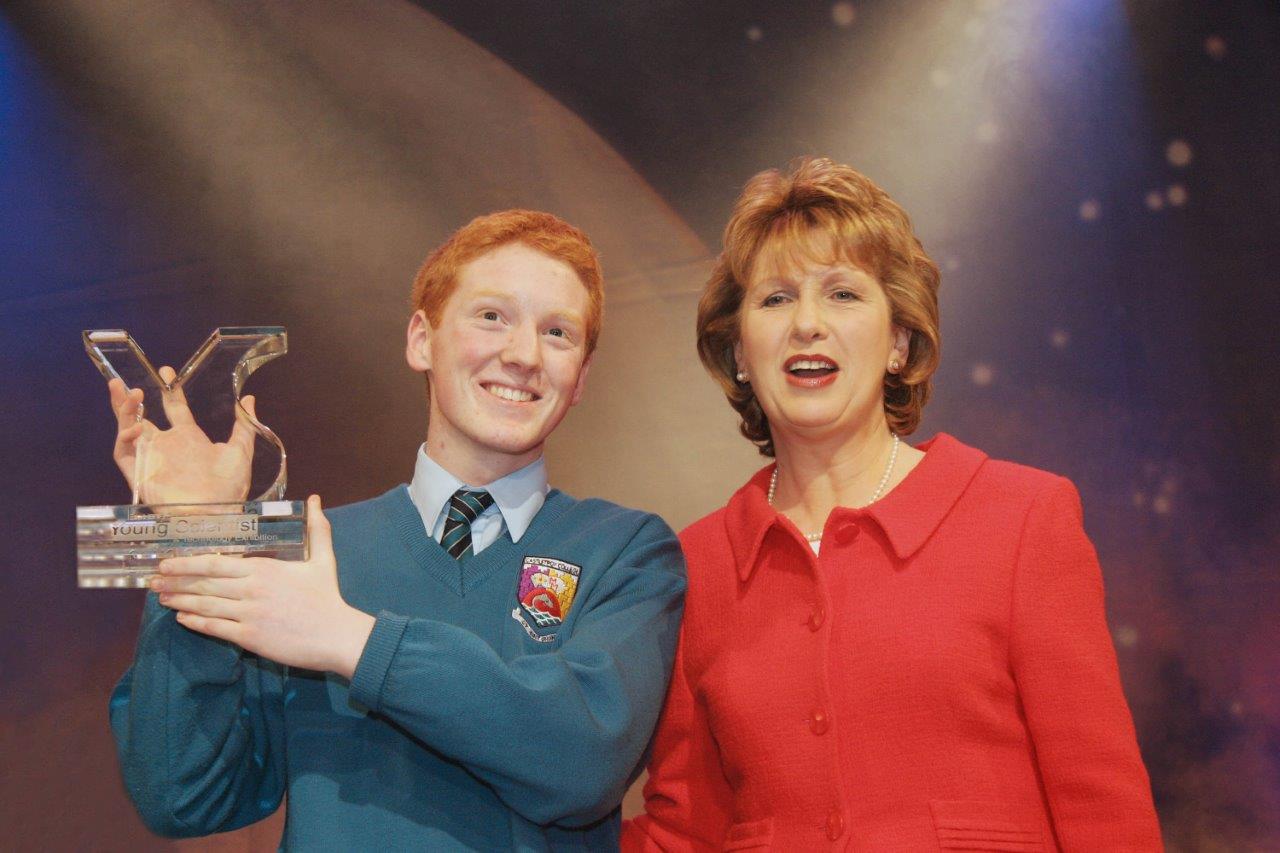Sinead Kane made history in January 2017, becoming the first visually-impaired athlete to complete the World Marathon Challenge – seven marathons on seven continents in seven days. Here, Sinead talks about hiring people with disabilities, bullying at work, how to overcome challenges and managing time efficiently.
The World Marathon Challenge is nothing short of a superhuman feat of endurance. Competitors must run the standard 26.21 miles marathon distance in Antarctica, South America, North America, Europe, Africa, Asia and Australia within 168 hours, or seven days.
Sinead Kane achieved this having only five percent vision. Sinead is registered as legally blind which made the challenge monumentally demanding.
A solicitor and PhD researcher from Cork, Sinead started running in 2012 when she took part in her first mini-marathon.
What’s the biggest misconception people have about employing someone with a disability?
That it costs too much money. Also, that the person has to be ‘minded’ and that they can’t be left on their own to do the job. And that you can’t ‘give out’ to a visually impaired person if they are not performing to the standard.
I think these are all misconceptions that employers need to educate themselves on. Hiring for diversity — especially those with a disability — shouldn’t be done because of a social or emotional obligation.
Similar to any other recruitment effort, you need to find a candidate who has the necessary skills, is a long-term fit for the organisation, and can provide real value to your company — all the qualifications that many disabled people possess. Hiring people with disabilities isn’t tokenism, it’s investment in your business.
Which was tougher, getting a piece of legislation through the Dáil or doing 777?
I think doing the 777 was tougher because with that you had to deal with a lot of physical, mental and emotional stress. Whereas the piece of legislation that I got through, which allows blind solicitors to have personal readers with them in the courts, was easier because I wasn’t confined to all the stress I had to cope with over the seven days.
“If you’re being bullied at work, it can have a major effect on your job and your confidence.”
What’s your average day like, how do you manage your time most effectively?
I am a full-time PhD researcher, so I try and get PhD work done. I do a lot of research, sourcing articles, reading, writing, summarising of articles and working on the PC. My day also involves run training, dealing with phone calls and emails about speaking engagements. Some days involve me doing voluntary charity work. Because of not having set hours with my PhD study, my day can be very varied, but these are things that fill my day. I also like to try and make time for family. I think it is important to develop effective strategies for managing your time to balance the conflicting demands of time for study, leisure, earning money, etc. My advice would be:
• Complete the most important tasks first
Each day, identify the two or three tasks that are the most crucial to achieve and do those first. Once you’re done, the day has already been a success. You can move on to other things, or you can let them wait until tomorrow. You’ve finished the essential.
• Learn to say ‘no’
Making a lot of time commitments can teach us how to juggle various engagements and manage our time. It can be a great thing. However, you can easily take it too far. At some point, you need to learn to decline opportunities. Your objective should be to take on only those commitments that you know you have time for and that you care about.
• Be conscientious of the amount of TV/Internet/gaming time
Time spent browsing Twitter or gaming or watching TV and movies can be one of the biggest drains on productivity. I suggest becoming more aware of how much time you spend on these activities. Simply by noticing how they’re sucking up your time, you’ll begin to do them less.
You have done amazing work on the issue of bullying in schools. What would be your advice for people who are being bullied in the workplace?
If you’re being bullied at work, it can have a major effect on your job and your confidence. Everyone has the right to work in an environment free from bullying, harassment, discrimination and violence. When you’re being intimidated or bullied by someone at work, it can feel as if your options are pretty limited.
You might want to avoid making a fuss or think people will assume you’re making a big deal out of nothing. If it’s a macho or competitive environment, you might be worried it’ll seem like you’re not tough enough to handle it.
You might also be worried about keeping your job. But, this behaviour shouldn’t go unchallenged.
There are things you can do and people who can help. First, I suggest taking the informal route such as approaching the person who is doing the bullying. Explain that their behaviour is unacceptable. If you find it difficult to approach the person, you can seek the assistance of a line manager, colleague, HR personnel or Trade Union representative. Mediation might also be helpful in this situation.
“Most of my speaking business comes from word of mouth from audience members recommending me to their friends and colleagues.”
If the informal route does not work, then you may need to move on to the formal stage. This will involve – checking to see what grievance and disciplinary policy is in place in the workplace. Following on from this you could make a formal complaint in writing to a member of management/HR Department. The person who is doing the bullying will then be notified in writing that an allegation of bullying has been made against him/her. That person will then be given a copy of your written statement and allowed to respond. An independent person should review your complaint and decide the next step.
The independent reviewer will likely want to meet with you and the person doing the bullying individually to establish the facts. They may also speak with other workers as witnesses. A report will then be completed and sent to management.
Both you and the perpetrator will be invited to comment on the report. What happens next really depends on the report’s conclusions. If your complaint is upheld, your boss will most likely progress against the perpetrator through the disciplinary process. If the complaint is not upheld, then the reality is that you may have to continue as you are, which of course could be very difficult.
If you are not happy with the outcome, you may have a legal remedy. In some cases, people feel that their conditions of employment are so severe that they have no option but to resign. It is important that you exhaust any grievance procedure before doing this and should obtain legal advice before leaving your job.
You are a frequent blogger. What tips do you have on setting up a blog?
Choose your website platform. For beginners, I suggest sticking with the WordPress content management system.
Next, find a domain name and host. To get a new website online, you’re going to need two things:
1: A domain name (a web address like yoursitename.com).
2: Hosting (a service that connects your site to the internet).
The WordPress platform itself is free, but a domain name and hosting will cost you.
Next, you need to install WordPress to your domain. Once you do these steps, you’re on your way to a fully functioning website.
You are also an accomplished public speaker, how have you developed your public speaking, do you do the same talk for everyone or tailor the content depending on the audience?
Most of my speaking business comes from word of mouth from audience members recommending me to their friends and colleagues.
Originally, my speaking developed because when I was in college, I was asked to talk to other students with disabilities and give smaller talks. Then in 2011 I set up my website as a hobby giving talks for free and donate any money that I earned from talks to a charity. I now do talks for schools and businesses.
I tailor my keynote speeches to the theme and the audience present. I match up the life lessons that I have learnt and experiences that I have encountered to align with the theme of the event.
Do you have any more (slightly insane) sporting challenges coming up in 2017?
I have lots of different goals in my mind which are insane which I would love to do but to do such goals requires preparation time and also requires sponsorship. If anyone out there is willing to back me, then please get in touch. People can find me on Twitter at @blindrunner777. I am also on LinkedIn and have a website.
What job would you love or hate to have?
I love being around people. I love presenting to audiences. I love exercising. There are so many things that I like to do that I find it hard to pick one particular job that I would love to do.
I won’t say I would hate it because hate is a strong word but I wouldn’t like to be a vet. I am very fond of animals, and I think I would be too upset and distressed seeing animals in pain. I greatly admire the work that vets do, but I don’t think I could do the job myself. I have a phobia of needles, and I am a vegetarian so any jobs that relate to blood or needles would not suit me. I think working in a slaughterhouse or a butcher shop would not suit me.
What three things would you take to a desert island?
A pen and scrapbook to record my experience of being there. Clean water to survive as the body needs water. A boat to leave for when I am bored or equipment that will allow me to make a boat.
Pictured is Sinead with her guide John O’Regan. For speaking enquiries, contact Front Row Speakers. Follow Sinead on Twitter @blindrunner777. Questions by Barry Walsh.







